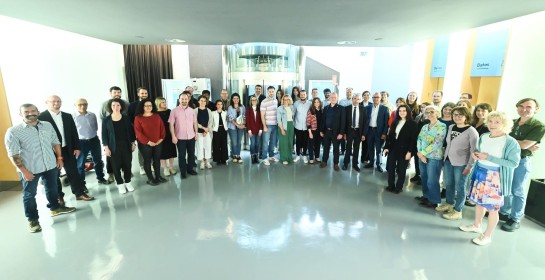Protecting the Mediterranean... all the way from Angers
Maxime Pontié, a professor at the Faculty of Science, and his team from the Analysis and Processes Group (GA&P) are taking action to protect the Mediterranean Sea from water pollution.

The members of the consortium met in Burgos (Spain) on 6 and 7 June to launch the IMERMAID programme..The IMERMAID (Innovative Solution for Mediterranean Ecosystem Remediation via Monitoring and Decontamination from Chemical Pollution) research and innovation programme, a Horizon Europe initiative, was launched on 1 June 2023 with a consortium of 26 partners (companies, researchers and innovation professionals).
With €8 million in funding from the European Union, the programme focuses on protecting the Mediterranean Sea basin from chemical contamination from wastewater by offering on-site analyses using electrochemical sensors developed in Angers, coupled with innovative water treatment processes.
More than 150 million people live along this coastline, and many businesses are also located there. However, wastewater treatment systems are not always optimally installed, or are non-existent, resulting in the appearance of contaminants of emerging concern (CECs) in seawater.
Maxime Pontié explains: "We are looking to reduce the use, emissions and pollution of these CECs by deploying new generation sensors and innovative solutions for prevention, monitoring and remediation. Ultimately, we want to prevent the spread of these chemical contaminants by treating them at source. We will also be working to strengthen European regulations to force polluters to improve the treatment of wastewater discharged into the Mediterranean Sea".
A first prototype by the end of 2024
For more than fifteen years, the GA&P team at the Faculty of Science has been working on electrochemical sensors for analysing and measuring the many organic micropollutants (pesticides, drug residues, dyes) found in polluted natural waters.
As Maxime Pontié points out, "With the IMERMAID programme, we will be applying our expertise to the field to offer an innovative platform for the monitoring of aquatic environments in the Mediterranean Sea, with a multi-sensor solution currently in the development stage".
The first prototype, consisting of several sensors, will be deployed in Tunisia in December 2024. Others will follow for tests in Cyprus and Crete. They will identify polluting molecules using molecular fingerprint sensors in the Mediterranean and industrial waters. These prototypes will then be used to assist remediation trials using innovative water decontamination processes developed by the other partners (photodegradation, plasma process, adsorption).
"Prospects for local applications could also be explored, given the water rehabilitation plan in the Pays de la Loire region. On a broader level, this project should help the University of Angers to provide solutions for better management of coastal waters" concludes Maxime Pontié.
Follow the programme
Get the latest news and updates on the IMERMAID programme on the website and on social media.
